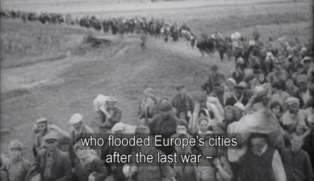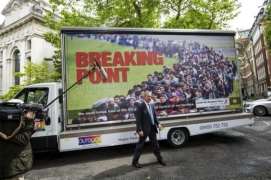Far Right Propaganda – A Historical Analysis
The parallels between modern far right propaganda and Nazi propaganda leading up to world war two.
Propaganda is defined in the oxford dictionary as “Information, especially of a biased or misleading nature, used to promote a political cause or point of view.” Propaganda is biased, persuasive and not objective; a form of media usepd to promote a point of view or political stance. Propaganda has been used throughout history to influence and shape views by selectively presenting information and withholding facts. The language and imagery used in political propaganda is carefully selected to conjure an emotional response from an audience rather than a more rational response.
The word “propaganda” is a word derived from the name of a new administrative body of the Catholic Church in 1622 entitled “Congregatio de Propaganda Fide” which translates as “Congregation for the propagating the Faith” or informally just “propaganda”.
There are three different types of propaganda; black, white and grey. White propaganda is the most credible and “comes from a source that is identified correctly, and the information in the message tends to be accurate” (Jowett and O’Donnell, 2012, p.17). The source is often well respected and the information is truthful, however, presented in a way which is biased to convince the audience that they have the best knowledge of political ideology. The best example of white propaganda is newspaper publishing throughout history as the source is clear however the content can vary depending on the political views of the writer. Grey propaganda is a type of propaganda that falls between black and white propaganda; it is often created by a private organisation yet presents itself like a credible source. Grey propaganda can be described best as “The source may or may not be correctly identified, and the accuracy of the information is uncertain” (Jowett and O’Donnell, 2012 p.20)”. In recent years the problem of fake news stories online is the most obvious version of modern grey propaganda. Black propaganda is the least credible type of propaganda and often comes from a fake or unidentified source and is used predominantly to spread lies. Black propaganda is often created with the intention of being portrayed as a credible source. A good example of the use of black propaganda was seen in the run-up to the 2007 federal election in Australia. Members of the liberal party circulated flyers around Sydney under the pretence of being circulated by an organisation called the “Islamic Australia Federation”. These flyers recognized the Australian Labour party for supporting Islamic fundamentalists and terrorism. The purpose of this was to conjure fear in the public and alter their political alliances.
In Germany in the 1930s, propaganda played a very large part in how the Nazi Party were perceived. Control over what people in Germany could see was heavily restricted which meant obvious propaganda was used in all media including literature, art, music, film, newspapers and radio. Dr Joseph Goebbels was put in charge of propaganda with the official title “Minister of Propaganda and National Enlightenment.” It was his role to ensure nobody in Germany could see or read anything that could be damaging to the reputation of the Nazi party.
Graphic design is key in conveying the messages of propaganda. “All art is propaganda. It is universally and inescapably propaganda; sometimes unconsciously, but often deliberately, propaganda.” This is according to Upton Sinclair, an American author and political commentator, and in the case of Nazi propaganda this was very true and deliberate. Views put across in Nazi propaganda seemed extreme in modern Britain until very recently. The idea that people were taken in by this blatant propaganda seems ludicrous, until you start to look at the startling correlation between imagery and views in Nazi propaganda leading up to world war two and propaganda created by far right groups in recent years.
- Historical context and Nazi propaganda paragraph
- Brexit Paragraph
 Â Â
  
Left: A Nazi propaganda film. The images come from a BBC documentary currently on Netflix called “Auschwitz: Nazis and the final solution”.
Right: Nigel Farage, leader of UKIP during the European referendum, standing in front of a UKIP pro-leave poster.
Despite not being part of the official “leave” campaign during the European Referendum in June 2015, Nigel Farage, Leader of far right political party UKIP made constant headlines throughout the campaign. The most controversial piece of propaganda over the last few weeks of campaigning was UKIP’s “breaking point” poster which depicts a long line of refugees trying to reach Europe. The photograph was taken by photographer Jeff Mitchell and shows refugees passing through an old railway line in Slovenia after being kettled by police, explaining the traumatised look on their faces. Jeff Mitchell intentionally took the shot to show the volume of people from an impartial humanitarian point of view as he explains “It was a very flat walk, so I scoped out a bridge to shoot from. I knew exactly what lens I was going to use, to compress the group, to show how many people were there. I could have walked with them the whole length, photographing how people were struggling, but you can sum it all up in one picture.”. The photograph is now one of the most memorable images of the right wing pro-leave campaign and far right politics in Britain. The text and design of the poster is also important. The banner along the bottom is very simple and easy to read and also looks extremely similar to the format of the “leave.eu” official campaigns posters which could potentially have been planned to blur the line between the two.
The “Breaking Point” poster was intended to evoke an emotional response from the audience. The image of the hundreds of predominantly male refugees was used so that British people voting in the referendum would feel fear or perhaps a need to protect their country from the unknown. Far right groups use fear and scaremongering in this way to incite hatred of foreigners and different races and religions. In the lead up to World War II, Nazi propaganda films were also used to spark this same sense of fear using volume of people. In my first image you can see a still from a 1941 Nazi newsreel showing the march of Bessarabian Jews in Romania. In this same newsreel, the Jews are also referred to as “parasites” which links strongly to how refugees are perceived today. The two images have a lot in common in both appearance and political message and both aim to evoke the same response from the audience – fear and hatred. Although, different Medias, the photography is similar and has been directly planned in order to show as many people as possible in the image. In the case of the “Breaking Point” poster, UKIP have appropriated this image for their own political cause, whereas in the Nazi newsreel, it is highly likely this was done intentionally. Another parallel between the two images which explain their form and the faces of those photographed is the events leading up to the images. In the photograph of the Jews travelling through Romania they were forced to walk in such a line similarly to the refugees in Slovenia who were “kettled” by police before being walked in a certain direction.
“But the most brilliant propagandist technique will yield no success unless one fundamental principle is borne in mind constantly and with unflagging attention. It must confine itself to a few points and repeat them over and over. Here, as so often in this world, persistence is the first and most important requirement for success.”
― Adolf Hitler
“The most effective way to destroy people is to deny and obliterate their own understanding of their history.”
― George Orwell
- US politics
“The American fascists are most easily recognized by their deliberate perversion of truth and fact. Their newspapers and propaganda carefully cultivate every fissure of disunity, every crack in the common front against fascism. Henry A. Wallace
Read more at: https://www.brainyquote.com/quotes/authors/h/henry_a_wallace.html“
The United States has it’s own propaganda, but it’s very effective because people don’t realize that it’s propaganda. And it’s subtle, but it’s actually a much stronger propaganda machine than the Nazis had but it’s funded in a different way. Crispin Glover
Read more at: https://www.brainyquote.com/search_results.html?q=propaganda+nazi
Progressives know there is something very wrong when a nation divided politically has one major network operating as a propaganda arm of the Republican Party and 90 percent of talk radio is dominated by right-wing extremists. Bernie Sanders
Read more at: https://www.brainyquote.com/search_results.html?q=right+wing+propaganda
- Conclusion Paragraph